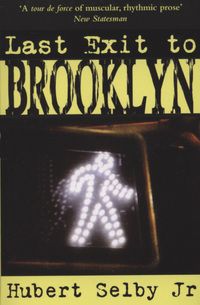Quotation: Hubert Selby Jr.

“WHATTA YAMEAN GIVIN THE KID A LOLLYPOP, EH? WHATTA YAMEAN? WHATS AMATTA WITH A LOLLYPOP? MEEE, YA THINK IT WAS GONNA KILLIM OR SOMETHIN. I TOLDYA I DONT WANT THE KID TA HAVE NO LOLLYPOPS. WHATTA YA MEAN? WHATTA YAMEAN NO LOLLYPOPS? ALL THE KIDS GOT LOLLYPOPS. WHY HE CANT HAVE ONE? I SAID. A KID CAN CHOKE TA DEAT ON A LOLLYPOP YA STUPID BASTAD. DONT YAKNOW NOTHIN? EVERYDAY SOME KID DIES FROM A LOLLYPOP.”
This classic piece of parenting advice features in the last of the vignettes in Last Exit to Brooklyn. I read the book on recommendation from one of the many very well-read individuals I worked with at Brum Uni, spring 2022. Recommended for its excruciating descriptions, following a discussion of using violent writing to capture non-sensationally visible slow violence, caused by e.g. capitalism and climate change, for an otherwise media-blinded Western context.
I wasn’t prepared for just how violent (and occasionally hateful) the book is. The tenderness of parts works to lower your defences, establish empathy. Then HSJ brutalises you with raw physical and verbal assaults. Racist, homophobic and misogynist language abounds amid representations of extremely violent masculine, working class communities.
The quotation is from one of the more forgiving exchanges between the (heavily stereotyped) Italian American couple. The all caps is initially cut with lowercase sentences about the children going into another room, until we’re left with the two arguing, often in front of the kids, about lollypops and haircuts and how much garlic to put in the pasta sauce. Most end with them threatening to kill each other. Some end in actual violence, but their story ends with a passionate finale that seals their need for each other in a difficult, caring way.
I could never quite suspend my disbelief and take HSJ’s caricatures as characters. It feels like the book never gets inside the working class precarity described because it’s too busy looking over its shoulder at a more privileged, highly-literate readership, as if to say, ‘Isn’t this awful?’ Many characters lack self-awareness or reflection, as if poverty has denied them an inner life, or the privilege to develop a moral framework. If this is deliberate – a distancing trick – it’s a dirty one because it leaves the reader to decide whether to impose such ideas on real people. But fiction’s a poor guide to reality and mere depiction can’t assume a reader’s compassionate response. Too easy to condemn, blame or heap condescension upon real, disenfranchised lives. And to forget the potential for cruelty and violence among privileged people, verbally or otherwise.
Yet there’s an emotional truth underlying this, a plea, perhaps, against real domestic, racial and gender abuse, for the world to not be this way, which draws the eye toward the systems and power structures that create such conditions. If HSJ had attended more to that facet, I’d have found it a more rewarding read.
